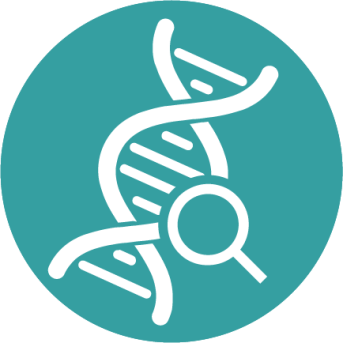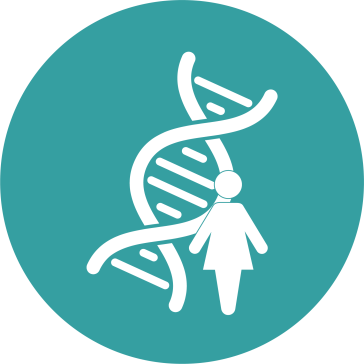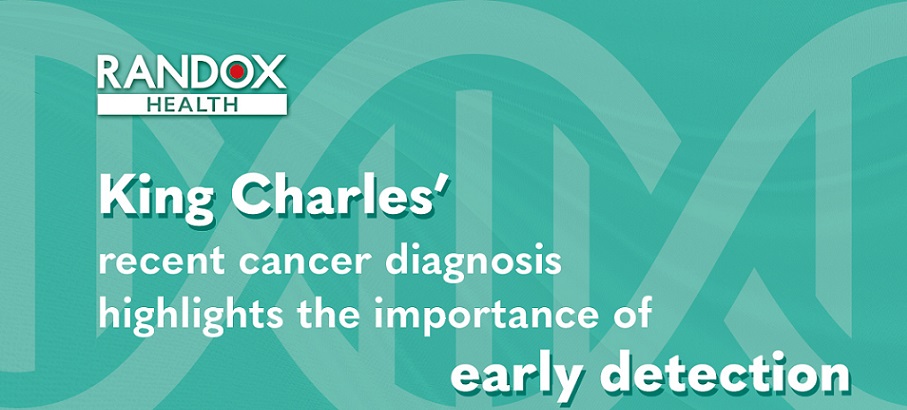08/02/2024
King Charles’ recent cancer diagnosis has highlighted the importance of early detection. By detecting potential health issues early at Randox Health, individuals can work with healthcare professionals to implement lifestyle changes, treatment plans, or preventative measures that can mitigate or event prevent the progression of certain diseases.
At Randox Health, we deliver the information to empower an individual to be proactive towards improving their health status enabling them to make informed decisions and take ownership of their well-being.
Using novel biomarker-based algorithms, Randox Health delivers real-time information on cancer risk e.g., prostate cancer and bladder cancer, allowing earlier intervention and treatment.
Traditionally, PSA (Prostate Specific Antigen) testing is mainly used to screen for prostate cancer, PSA measures the level of Prostate Specific Antigen in the blood and can indicate abnormality within the prostate. Although PSA is highly specific for prostate disease, it is not specific for prostate cancer. It’s estimated that 75% of men with raised PSA levels actually test negative for prostate cancer. So if cancer’s ruled out, what are the other complications associated with raised PSA levels? A raised PSA can also indicate an enlarged prostate, prostatitis, or a urinary tract infection.
The new Randox Health testing panel includes PSA testing, as well as analysis of a novel combination of Biomarkers to help determine the risk of prostate cancer. The inclusion of the additional biomarkers, and the employment of the algorithm can help to assess your risk of prostate cancer helping to reduce the need for unnecessary and invasive further investigations in low-risk individuals. A recent study demonstrated that our novel combination of markers significantly improved the predictive potential of PSA alone in identifying individuals with prostate cancer.
It is estimated that 30-50% of all cancer cases are avoidable, in many cases early detection is key and can save lives – cancer that is diagnosed at an early stage, when it isn’t too large and hasn’t spread, is more likely to be treated successfully.
Spotting cancer at an early stage saves lives, many people however, don’t have access to the information or services to facilitate this detection – Over 8 million people within the UK are currently awaiting diagnostic testing, At Randox Health, with over forty years’ experience in working towards improving healthcare worldwide, we have a focus on preventative healthcare; aiming to achieve better health outcomes whilst reducing the burden on clinical services.
At Randox Health we offer genetic risk tests for inherited cancers including Breast and Ovarian Cancer, Bowel Cancer and others. In addition, we offer a range of full-body health checks that include common tumour-associated markers.
The results gained allow you to not only get a more accurate interpretation of your current health status but knowingly make lifestyle changes allowing you to prevent future health risks.
Signature Platinum – £2600
Get truly unrivalled insights on your current health and future health risks that empower you to take action to help improve your health and prevent illness.
Measure 350 health data points relating to your full body health including genetic, stress, neurological & tumour associated markers with full repeat testing after 6 months is included to allow you to effectively evaluate the progress of your health journey to the fullest and identify further areas for improvement.
GPs appointments, referrals and prescriptions are included if required.
Cancer Risk testing available at Randox Health:

Genetic Cancer Risk – £750
1 in 10 cancers are thought to be caused by hereditary gene mutations. Our Genetic Cancer Risk test covers 94 different genes suspected to play a role in predisposing one to cancer, including genes associated with increased risk of breast, ovarian, prostate, colorectal and thyroid cancer.
If a genetic variant linked to cancer is found there are options available to help reduce the risk of developing cancer.
- Lifestyle changes
- Regular screening and health checks
- In some cases – risk-reducing surgery.
Our Genetic Counsellor will guide and support you throughout testing processes and will also be available to explain your results and advise on next steps.
Genetic Breast and Ovarian Cancer Risk – £499
Around 5-10% of breast cancer cases are thought to be hereditary and up to 20% of ovarian cancers are genetic. Our Genetic Breast and Ovarian Cancer Risk test covers 8 different genes including BRCA1 and BRCA2 associated with both hereditary breast and ovarian cancer.


Genetic Bowel Cancer Risk – £499
It is estimated that 1 in 15 males and 1 in 8 females will develop bowel cancer in their lifetime with around 5-10% of all bowel cancers thought to be caused by a mutation in a known gene. Our bowel cancer risk test screens for mutations in 11 different genes associated with increased risk of bowel cancer.
Advanced PSA – £49
Almost 50,000 men in the United Kingdom (UK) are diagnosed each year with prostate cancer (PCa). Secondary referrals for investigations rely on PSA levels and digital rectal examination. However, both tests lack sensitivity and specificity, resulting in unnecessary referrals to secondary care for costly and invasive biopsies.
Using a novel combination of biomarkers including PSA, our Advanced PSA test produces a prostate Cancer Risk Score that can help to assess your risk of prostate cancer and help reduce the need for unnecessary, invasive further investigations in low-risk individuals.
A recent study demonstrated that the combination of markers included within this test significantly improved the predictive potential of PSA alone in identifying individuals with prostate cancer.


Everyman/ Everywoman Plus Tumour-Associated Markers – £857
With this health package you can get unrivalled insights on your overall health in addition to several tumour markers associated with bowel, ovarian, prostate, liver, and pancreatic cancer from a simple blood test. Regular health screenings helps to identify risks early allowing you to get the appropriate treatment sooner.



